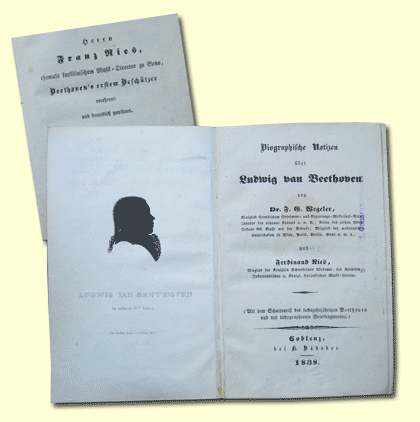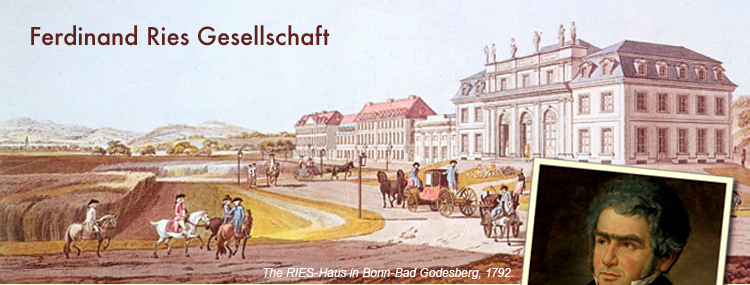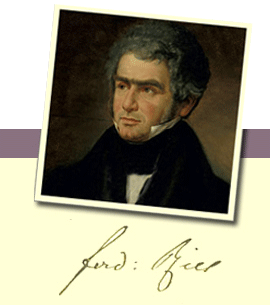Biography - Frankfurt a. M.
The Free Imperial City of Frankfurt, a hub of commerce and a showplace of bourgeois self-assurance, boasted a rich cultural life with its own opera, theatre and frequent concerts. It was here in Frankfurt, with his composition of “The Robber’s Bride”, that Ferdinand Ries first made a name for himself as an opera composer. It had its première in Frankfurt on 15th October 1828 and was then performed in numerous German cities.
In 1832/33 Ries and his wife undertook a long “musical education tour” of Italy, visiting Venice, Milan, Rome and Naples. It was during this tour that Ries composed his last concerto, No. 9 for piano and orchestra in G minor (Op. 177), and also his last string quartet (F minor, WoO 48). This tour was followed, in 1836, by a five month’s working stay in Paris. His compositions were performed there both publicly and privately, and his Symphony No. 4 was performed in one of the then famous concerts of the Conservatory Orchestra of Paris, which was indeed a great honour, as the orchestra otherwise played symphonies by Beethoven to the exclusion of almost everything else. Wherever he went, Ferdinand Ries received a glorious welcome as a famous pianist and composer. Ries attempted many times to obtain a position as orchestra leader in various cities in Germany. He was occasionally recommended for such a position abroad (in Liège, for example), but either his complete fixation on German music was not appropriate or he himself refused to accept the offered position when the necessary “complete musical independence” (F. Ries) could not be guaranteed. This liberal approach, which he also practised in other spheres of life and which he probably brought back with him from England to the overridingly conservative Germany of the pre-1848 period, was in the final analysis the reason why he only very occasionally had the opportunity to work with large orchestras and outstanding musicians. On 1st June 1836, Ferdinand Ries held a highly acclaimed concert in Frankfurt's Hotel Weidenbusch in aid of support of the Beethoven monument planned for Bonn. The central work in this memorial concert was the Third Piano Concerto in C minor, which he played himself and which he had performed for the first time in Vienna in 1804 as a student of Beethoven. Ries donated the considerable proceeds from this concert to the Bonn Committee to erect the monument for his friend and teacher Beethoven. When the position of director of the Cäcilienverein in Frankfurt became vacant in August 1837, Ferdinand Ries was approached with the offer to take over the position and he accepted.
Following the death of Ludwig van Beethoven, Ferdinand Ries and the Koblenz physician Franz Gerhard Wegeler, a former citizen of Bonn and a lifelong friend of Beethoven’s and the Ries family, planned to publish their recollections of their friend. Fully aware of the composer’s significance and uniqueness, Ries and Wegeler created a lasting literary memorial to Beethoven. The biography contains information about the man and the musician that only people who had lived in his immediate vicinity could possibly possess. The “Biographische Notizen über Ludwig van Beethoven” were published in Koblenz in 1938, just a few months after Ferdinand Ries’s death. Ferdinand Ries died in Frankfurt on 13th January 1838, too soon to witness the publication of the book. He was laid to rest in the family vault of his friends, the Klotz family, in the Central Cemetery of Frankfurt. Translation: John Brogden, Dortmund, Germany
Bildquellen:
|
|
|||||||||||||||||
© Ferdinand Ries Society | Sitemap | Statutes | Links | Colophon
|
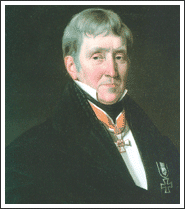 The Ries family moved to Frankfurt at the beginning of April 1827. Their fourth child, a daughter, was born there at the end of April. They bought a house not far from the Bockenheim Gate. Its music room was to become a meeting place for musicians and music lovers from near and far.
The Ries family moved to Frankfurt at the beginning of April 1827. Their fourth child, a daughter, was born there at the end of April. They bought a house not far from the Bockenheim Gate. Its music room was to become a meeting place for musicians and music lovers from near and far.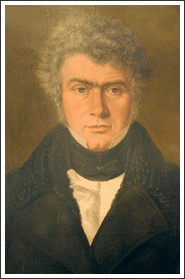 The intellectual climate of Frankfurt gave fresh impetus to Ries’s work. Besides his almost regular directorship of the Lower Rhenish Music Festivals in Cologne, Aix-la-Chapelle and Düsseldorf (1825, 1826, 1828-1830, 1832, 1834 and 1837), he was invited in 1831 to take charge of the Music Festival in Dublin. Ries made this an opportunity to spend several months beforehand in London where, between May and August 1831, he composed his second opera, “The Sorceress”.
The intellectual climate of Frankfurt gave fresh impetus to Ries’s work. Besides his almost regular directorship of the Lower Rhenish Music Festivals in Cologne, Aix-la-Chapelle and Düsseldorf (1825, 1826, 1828-1830, 1832, 1834 and 1837), he was invited in 1831 to take charge of the Music Festival in Dublin. Ries made this an opportunity to spend several months beforehand in London where, between May and August 1831, he composed his second opera, “The Sorceress”.